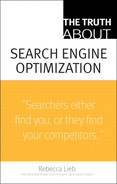A solid link strategy is essential to SEO. Links—inbound, outbound, and internal—lie at the heart of any SEO effort. No well-optimized website or page is an island. As discussed earlier, links are the information roads and streets of the information superhighway, so to speak. Only by following links to pages from other links are search engine spiders able to navigate the vast cosmos of the Internet and find all that content that they index.
Spiders also use these links to weed out obsolete content from its index. That’s why linking from existing sites to a brand-new website can help it get indexed very quickly. There are no guarantees, of course, but I’ve seen sites appear in Google’s index in two to three days after they were linked to.
This is, in fact, in keeping with Google’s own recommendations to webmasters, as follows:
"The best way to ensure Google finds your
site is for your page to be linked from
lots of pages on other sites. Google's
robots jump from page to page on the web
via hyperlinks, so the more sites that
link to you, the more likely it is that
we'll find you quickly."
Links are also an essential factor that search engine algorithms use to determine the ranking of a website or page. Should it be result #1, or appear buried on page 22 of the search results for a given query?
Inbound links to your site—that is, other web pages and sites that link to yours—are something search engines deem akin to votes. Others use the analogy of a popularity contest. Links say, “Hey! Click over to this page. It matters. It contains information you might be interested in taking a look at. If you think our page here is worthwhile, we recommend that you take a look at that page over there.”
Search engines determine ranking in part based on the number of links pointing to your site. But simply having inbound links to your site isn’t enough. In the world of search, it’s not just quantity—it’s the quality of links that matter. This is where a link strategy gets, well, strategic.
Not all links are created equal.
There are lots and lots of different types of links, of course. There are also links that have no influence whatsoever in SEO that you still wouldn’t say no to. A link in an e-mail newsletter, for example, can generate lots of quality traffic without Yahoo!, Microsoft, or Google having the slightest idea it exists.
Search engines weigh links to your site from other websites based on the quality of the inbound link. So, what’s a quality link? Only the search engine companies themselves know for sure how their algorithms (which are secret) work. However, sites with high PageRank (see Truth 39, “Don’t live and die by PageRank”) are likely to confer the highest-quality links. In the broadest possible terms, a quality link comes from a prestigious, authoritative website that contains content that’s contextually relevant to the content on your own site. If your site examines news or current affairs, a link from The New York Times or The Wall Street Journal is of infinitely higher value than a link from a site that sells cleaning supplies, or one from a scarcely read, seldom-updated blog. In advertising parlance, every link could be considered to be an endorsement. The best links are something akin to celebrity endorsements.
Of course, not every site is going to get a NYT or WSJ link, nor do they need to. What the search engines are looking for is something akin to a popularity contest. Links are reputation enhancing, and help search engines determine how important a page is. Are the links to your sites relevant? Do they come from sites that have relevant or related content? What’s in the text that actually surrounds the link? It matters. Think back to that site selling cleaning supplies. It may be the most popular supplier of brooms and mops on the Web, but a link from a page about brooms and mops to a page on your site discussing foreign economic relations is not going to do much for your ranking.
On the other hand, links between our broom and mop purveyor and a website offering cleaning services are more than appropriate. Ditto for links in this constellation from “how to get stuff clean” pages. These sites could include dealers in other types of housewares, sites that talk about getting the right tools for a specific cleaning job, sites that sell detergents and soaps, or news stories about the company selling those mops and brooms.
All these kinds of sites (and likely more) are in the relevant linking realm. All would serve to boost the mops and brooms site’s visibility and relevancy with search engines.
A very basic approach to getting relevant sites to link to you is to appropriately link to them. Searching for your target keywords on the major search engines will quickly reveal the most relevant sites and pages. The higher they rank in the search results, the more relevant the search engines consider them to be. Visit and assess these pages, and drop a personalized note to the site owner to politely request a link. If you’ve linked to them, show them where by providing the URL (more on reciprocal linking in Truth 24, “Share and share alike: Reciprocal linking”).
Another good place to start is a quick check of who’s already linking to you. A number of link analysis tools can perform this function, or you can simply search Google or Yahoo! using this link: www.YourDomain.com.
